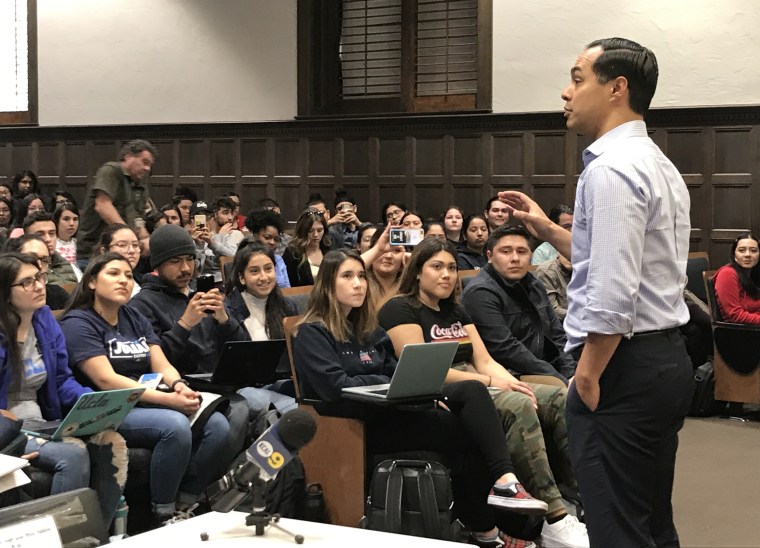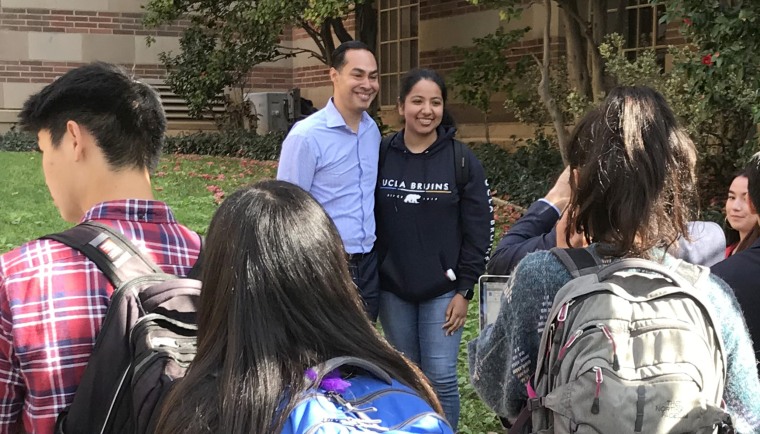LOS ANGELES — Milton Castro, a student at East Los Angeles Community College, ticked off the names of those he knows are in the mix of candidates running for president.
“Sanders. Harris? She’s local. The vegan,” he said.
He was referring to Sens. Bernie Sanders, I-Vt., who lost the presidential primary to Hillary Clinton in 2016; Kamala Harris, D-Calif., California’s former attorney general; and Cory Booker, former mayor of Newark, New Jersey, who is a vegan.
Milton Castro, 28, didn’t name the candidate who shares his last name — Julián Castro, the former Cabinet secretary in the Obama administration and former San Antonio mayor. Milton Castro said he'd heard about "a Castro", but hadn't "looked into him."
The day before, Julián Castro had ping-ponged around Los Angeles in his first campaign swing to talk to voters in the state since announcing his run for president Jan. 12. His focus was largely on young Latino voters, those who are turning 18 at the pace of about 1 million a year. He also met with several black and Latino community organizers and a young professionals group that drew many Latinos.

The Golden State’s likely voters tend to be younger, according to the Public Policy Institute in California. The state had a record turnout of voters in last year's midterms, and it saw a jump in young voters. The state's Latino voters increased their turnout rate as well.
With so many turning voting age, young Latinos are a coveted target for the ample field of Democrats eyeing the White House.
The pressure is on for the candidates to court Californians because the state moved up its primary. In 2016, California's primary was held June 7. In 2020, the primary is scheduled for March 3, and early ballots can be mailed in as early as Feb. 3.
“California is extremely important in the 2020 cycle. Its primary is early and it has the most delegates of any state. It has the most Latino voters of any states in the country and they will have the largest influence. It’s the big Latino prize,” said Matt Barreto, a University of California, Los Angeles political scientist and co-founder of the polling firm Latino Decisions.
Castro is the only Latino in the Democratic primary race and younger Latinos tend to vote Democrat. In California, eight-in-10 Latino voters in 2016 were of Mexican origin. While Castro's Mexican-American heritage doesn’t make him a shoo-in among the numerous Democratic candidates, it can keep him from being written off as well.
The crowded field includes Sanders, who had success with younger Latino voters in 2016. There's also possible competition from fellow Texan Beto O’Rourke, who excited young voters despite his failed U.S. Senate run in his home state, and there are several women in the race.
Experts say young Latinos are less likely than their older peers to back a candidate because they identify with them racially or ethnically. But in this week’s campaign swing, Castro piqued the interest of some of the young Hispanics who heard him speak or were interviewed about him.
The son of Chicano activist Rosie Castro, the presidential hopeful spoke to Barreto’s Chicano studies class, an elective taken by students seeking degrees in a variety of disciplines. Barreto, who has done polling for Democrats and Democratic candidates, said he is neutral in the primary race.
Bella Aguilar-Rosil, 20, a third-year student and Chicano studies major, said Castro’s visit would have an effect on the students as they try to pick a candidate.
“It’s very important he’s here — when people like this come and speak to the classes, it’s making an impression. When it comes to the ballot and you see someone’s name you are familiar with, it makes a difference,” Aguilar-Rosil said.
Like many students in the class, Aguilar-Rosil is a first-generation college student. Her parents are from El Salvador and Mexico, and she said she identifies as Chicana.
“Seeing someone whose mother was a big, large part of the Chicano movement is key. Initially, before doing my research, I knew more about his mom than him,” she said.
In the 2016 primaries, the Latino vote divided on a generational line, which was first seen in the Nevada caucuses, according to Mike Madrid, a Republican strategist who also has done work for Democratic candidates and is a principal with Grassroots Lab.
Sanders ended up winning overwhelmingly with Latinos under 35 in 2016. Older Latinos lined up behind Clinton, who ultimately won California.
Aguilar-Rosil wasn’t old enough to vote in the Democratic primary in 2016, but said she backed Sanders and would have voted for him. She voted for Clinton in the general election because she had turned 18 by then. Though she has not settled on backing Castro, she said his candidacy deserved consideration.
“It’s really just important for any Latino to see a Latino in power,” she said.
Although Castro launched his campaign from the west side of San Antonio, the Mexican-American neighborhood where he grew up, he has taken his campaign to Idaho, Iowa, Utah and Nevada so far, and has made a pledge to visit all 50 states.
While he's not distancing himself from his Mexican-American heritage, he's also trying to avoid being pigeonholed as a candidate, a balancing act similar to what Clinton had to face as she tried to become the first woman president.
“I do think that as president, I have to represent everybody and during this campaign. I’m articulating a vision for America that includes everybody as it should, no matter who you are” he told one of the UCLA students who asked how he’d motivate Latinos to vote.

However, he added that he thinks his campaign will inspire Hispanics to get active in the election, turn out and vote "because in so many ways the community, even though we've been here a very long time, it's still invisible. It's been written out of the equation in the way things are covered and we need to change that."
At UCLA, Castro fielded several queries on immigration and about the Trump administration's policy of separating children and parents at the border. He was asked about how the country can enroll more children into Pre-K, how the North American Free Trade Agreement impacts Central America-fed immigration to the United States, his plans for bringing fairness in criminal justice, his view on legalizing marijuana, and about tax breaks for corporations, among other topics.
Before UCLA, he spoke to students at Bell Gardens High School in East Los Angeles. Principal Juan Herrera said the visit to the school that is 99 percent Latino, with 93 percent of students receiving free or reduced lunch, was the first by a presidential candidate.
Students there wanted to know how he could win with so many other candidates in the race and what separates him. To cheers and whistles, he said that he was the "antithesis" of President Donald Trump and that he has a track record of honesty and integrity in public service.
“On top of that, I’m just going to go out there and work hard. I’m going to work hard like all our families do,” Castro said.
He drew big applause from the high school students when he spoke of tackling climate change and needing to raise teacher pay.
Adriana Espinoza, 30, a research associate in public health now working on an HIV research project, was among a group of people crowded into a conference room to hear Castro speak at the young professionals gathering.
She said she's been his fan for a while and had rooted for him to be Clinton's running mate in 2016. Espinoza said even though she's not 100 percent in Castro's camp right now, he's probably one of her top two picks — Harris edges him out for her vote right now.
"I think a lot of the Democratic candidates have the same message. They are saying all the things we want to hear. I think it's more I identify with him, as a Latina," Espinoza said.
Castro told NBC News his goal is to mobilize and connect with Americans everywhere, but he’s confident his campaign is going to inspire a lot of young Latinos and Latinas to get engaged.
“It’s time because in too many ways, the community has been overlooked for a long time, has not been part of the conversations we need to be a part of as the largest minority group in the country, whether the issue is immigration or the economy or education, health care.”
FOLLOW NBC LATINO ON FACEBOOK, TWITTER AND INSTAGRAM.


